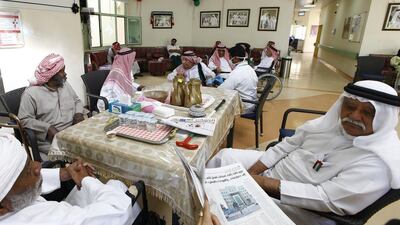ABU DHABI // The UAE’s ageing population and rapid social change is putting welfare of the elderly at risk, sociologists say.
Urbanisation has led to the erosion of the traditional family structure, leaving many old people isolated, they say.
“These were the result of several factors such as urbanisation, technology transfer, educational progress and different patterns of emigration,” says Dr Mohammed Firoz, a sociologist.
“These transformations have affected the family structure. These developments led to reduction or decline in traditional family roles of caring for older persons.”
With more women joining the workforce, caring for children and the elderly is becoming a challenge.
“The heavy reliance on domestic workers to carry on some of the roles and duties of the family can’t be sustained in the long term,” Dr Firoz says.
Aisha Al Ali, director of the Mohammed bin Rashid School of Government, says the migration of young nationals from the Northern Emirates to Dubai and Abu Dhabi makes it more difficult for the elderly people they leave behind.
“Life in the UAE has dramatically changed, more rapidly than in the past, as numerous changes took place escalating modernisation and developments influenced by demographic transformation, urban development, technology development and openness to more than one culture,” says Ms Al Ali.
Dr Salwa Al Suwaidi, head of the Family Gathering Centre in Dubai, says some people think their family responsibility ends at providing a room, a maid, three meals and medication. Not enough consideration is given to elderly people’s need for company.
“They need someone who listens to them and lets them talk about their past,” she says. “We can deal with medical condition one way or another, but it is equally important to deal with their state of depression and loneliness. If the elderly patient is happy they can better cope with medical complications.”
She says there should be more gathering centres for the elderly, with activities and medical support.
Dr Al Suwaidi says that the emotional issues of elderly women are different to those of men.
“Both suffer from different kinds of losses,” she says. “Old age is the time of loss, which could be in the shape of authority, job, income, friends and health.
“For a male it is hard to accept that he is no longer number one and his son is taking his position.
“For females, separation from children and sharing with their spouses becomes traumatic. However, whatever their loss may be, the solution in the Emirati society comes from family and children.”
Dr Al Suwaidi emphasises the need to plan for retirement.
“Elderly people in our society surrender easily to old age and start depending on others,” she says.
akhaishgi@thenational.ae

